#brutal and extremely traumatized man who saves kids (girls) from traumas of their own
Explore tagged Tumblr posts
Text

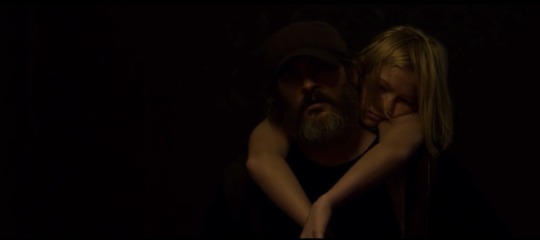
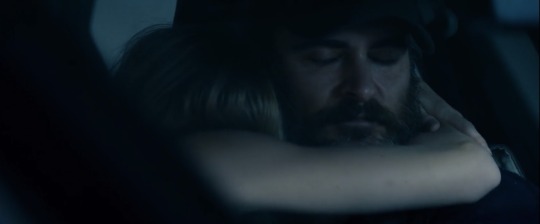
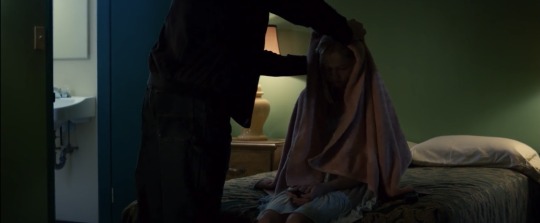
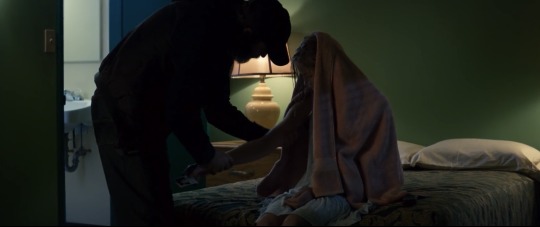
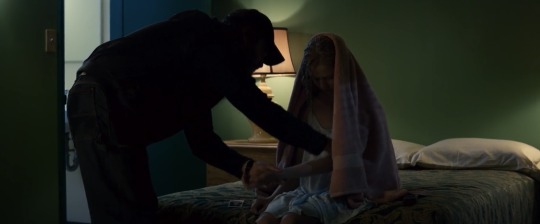

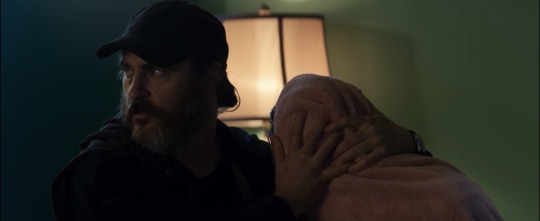


We can go wherever you want. Where do you want to go?
I don’t know.
thanks @shinhatism for recommending this movie to me! <3 love to feed that brainrot
#we all know how much I loving going insane with this trope#brutal and extremely traumatized man who saves kids (girls) from traumas of their own#but he gets attached to one (1) and kills. a lot of people to find her.#all while being eaten alive by what still haunts him#HES SO GENTLE WITH HER#he literally. a hammer is his weapon. he beats so many men with it#and then when it’s her#he.#he checks her for injuries and gives her a towel and hugs her back and holds her and#yea anyway. WILD and very cleverly shot movie#if you’re queasy like me then there’s a few scenes to be mindful of which you can see coming#except for that last one 🤠#but yeah!! movie was p good and super super deep#you were never really here#joaquin phoenix
25 notes
·
View notes
Text
Lisa Shepard vs Batarians
Behold, a meta about Lisa I’ve long wanted to write, inspired by this post about Torfan(got kinda long for just a reblog) and motivation provided by @fourthage‘s Mass Effect giveaway. (I’m much better about finishing things when I can give it a deadline, lol)
----
Lisa is my Colonist/Ruthless Infiltrator Shep, and let me tell you, that background combo made her really interesting to play(through the first two games, at least; my computer crashed before I had a chance to import her to ME3, rip) bc she has this big, glaring problem with batarians. The tl;dr is Mindoir was deeply traumatizing and no batarian ever did enough to counter the extremely negative image she has of their race as a result. (apologies for slight stream-of-consciousness rambling, I tried to rein it in, but I think I was only partially successful >.>)
So we start, obviously, on Mindoir. Lisa’s the oldest of four with three younger brothers; Justin, Finn, and Connor, and had two best friends; Javier and Laura. Life was routine and uneventful and the only thing she cared about the larger galaxy was getting to explore it with Javi and Laura after they all graduated.
And then the batarian raid happened. Lisa didn’t see her parents die, but she did see friends die in the initial attack, as well as Laura’s dad. She had to watch Finn and his best friend(Talitha) get dragged to a shuttle. She, Javi, and Laura hid in a storage shed with their remaining younger siblings(one of Laura’s sisters was gone, too) in hopes of keeping them safe. They spent the next three days in there. They were found by a few batarian patrols, somehow managed to kill them all with bare hands and makeshift weapons(or stolen, Lisa got a pistol off one she killed), even as their own numbers got picked down, younger sibling by younger sibling, and then Laura, and then Javi, until.Lisa was the last one left, memory etched with hearing her best friends and younger brothers, brothers she’d promised her parents she’d look out for, die very terrible deaths.
She was found by a couple soldiers from the rescuing Alliance patrol, and actually attacked them when they first came in the storage shed. They had to calm her down, and one went so far as to pull off his helmet so she could see they were human and weren’t going to hurt her. He introduced himself as Gabe and guided her out of her personal hell, both literally and figuratively. After everything she’d witnessed and heard and knew had happened to the colony, to her home, at the hands of the batarians, Lisa didn’t feel the least bit guilty for being glad the Alliance killed every last one of the slaving bastard scum they found. She’d lost everyone in the world she cared about to those monsters, she had every right to be glad they paid for it.
The soldier, Gabe, stuck with her until she’d made it back to Earth and escorted her to the foster home that had agreed to take her in. checked up on her a few times, offered to let her live with him and his roommates(another man and a woman, all three of them soldiers) if she wanted to. She took him up on that, and by the end of the third or fourth month, he was big brother and best friend rolled into one. Being on Earth meant she didn’t really have much(if any) direct interaction with batarians, but she was still working through her trauma and every time she heard them mentioned in news reports it was batarian pirates attacking a civilian vessel or batarian slavers raiding another colony--human, turian, whatever, all it did was reinforce her hostile view of them as a race.
She joined the Alliance military when she turned eighteen, feeling it was the best way to act out her gratitude of them saving her. She still missed her family and friends, of course, but she was healing and adjusting and while batarians still get her hackles up, she wouldn’t go out of her way to cause trouble with them. Largely because that would reflect badly on the Alliance, and she doesn’t want that. She proves to be an excellent soldier, tech genius, and near-unparalleled sniper, which is what gets her the rec for N-school(courtesy of Captain Anderson, who was Gabe’s CO. Gabe introduced them the day she enlisted). She excels in N-school(she’s always been the sort to thrive on challenge) and is clearly going to graduate with flying colors, so she and Gabe work it out--he’s coming for the ceremony, they each manage to get leave for the following week, they’re gonna spend time catching up and celebrating and just get to see each other face to face for the first time in... over a year.
And then, the week before graduation, Gabe is killed rescuing a diplomat’s kid from, you guessed it, batarian pirates(he’s one of only three KIA on that mission, which doesn’t make it sting any less)..That is when they cross the point of no return in her eyes. Two separate groups of batarians are responsible for the deaths of her family twice over. Clearly this was not a “few bad individuals” thing; this is a failing of them as a people(A people who have enslaving others enshrined as part of their culture to the point of calling it discrimination when they’re not allowed to practice it).
She is a driven, pragmatic, determined individual who wants to represent humanity and the Alliance well and so works just fine alongside every other race in Council space. She’s always willing to help, also always willing to make the hard calls to get a job done bc she learned early that people die. You can’t save everyone every time. You still try your damnedest to do it, but sometimes you can’t. And sometimes people die as a result of your decisions and you have to be able to live with that. She can.
And then TORFAN. Well, first Elysium, and then Torfan. By this point, she’s N4, risen to Commander, and absolutely willing to push her squad however hard it takes to accomplish their goal. (In any circumstances, these just happen to hit a tad closer to home than usual) The fight through Torfan’s tunnels to the pirate base is brutal, and there are several times her men point out maybe they should turn back. But she pushes on bc their mission is to take out this group of pirates. In her mind, batarians are already a threat, given their culture of slaving, piracy, and utter disregard for life and others in general. If they get away with attempting a full-scale attack like they did on a world like Elysium, they’ll be exponentially more dangerous. So there have to be repercussions and they have to be swift and they have to be brutal and unflinching and if she’s the one who doles that out so be it.
It costs her 3/4 of her squad, but they do it. They fight the pirates to the point of surrender and then Lisa shoots them anyway. Her mission was to eliminate the enemy, and she’s A) worried the batarians are surrendering as a show, with no intention of actually being prisoners, and B) convinced even if they did surrender, the Hedgemony would demand their return as “political prisoners” or something, with good odds they’d be released after just enough time this “incident” will have faded from people’s memory, and she doesn’t want to risk either. So the dozen-odd surrendering batarians still.die. And while she didn’t take pleasure or satisfaction in doing it, she doesn’t regret it either. Her thought process is somewhere along the lines of “These are sadistic, murdering, slaving scumbags, who have the audacity to ask for the mercy they would never in a million years show their victims. The galaxy is better off without them.”) She doesn’t care it gets her labelled “The Butcher of Torfan” and that people look askance at her when they know her record. She got the job done, the galaxy is just that much safer, and she’s not going to lose any sleep over batarians.
She makes N7 and gets the Spectre nomination bc she pushes herself just as hard as anyone under her command, always gets the job done, and--aside from batarians--has no issue working with other races. When it comes to anyone else; turians, asari, hanar, whoever, she’s all too happy to follow Kaidan’s “jerks and saint, just like us” philosophy and judge them on an individual basis, but--and I’ve actually had her say this in fic--”If you ever find a saintly batarian, let me know and I’ll pin a medal on their chest my-damn-self”. Between what’s known of batarians as a race and culture and her own first or second hand experience, there is nothing redeeming about them in her eyes. (And it’s a very good thing she didn’t run into any during that... week after the Talitha encounter in ME1, bc she probably would have ripped them to shreds with just her bare hands and her omnitool after hearing what that poor girl went through.) She’s not going to go out of her way to gleefully/vindictively slaughter them, but she’s not feeling too charitable or sympathetic toward them, either. If I may make a cross-franchise reference, Lisa’s feeling on batarians are very similar to how Fenris feels about mages in DA2, only unlike him, she hasn’t gotten any examples they’re not all Like That(TM).
As of the end of ME2, she has not seen any evidence to counter her view of batarians, so it’s a view she’s gonna go into ME3 holding(whenever I get around to completely redoing her game), and I don’t see her changing it much at this point. It’s a flaw, and it’s one that’s going to persist probably her entire life, but it made playing her so much fun. (especially since my two previous Shepards were 98% Paragon ANGELS who are best described as bleeding hearts. xD)
#lisa shepard#mass effect meta#hooo boy that got long#torfan#mindoir#tried to stay vague about what she saw on mindoir but if it's still bad enough i should tag let me know#mindoir was BAAAAD
19 notes
·
View notes
Link
On July 6th 1994, twenty-six year old Troy Kell, inmate and white supremacist gang member at Utah State Prison, killed Lonnie Blackmon, a black inmate, with 67 blows from a prison shank while prison guards videotaped the attack. The deed done, Troy wiped his hands clean of the blood and walked away, proudly yelling:
“Got some white power jumpin’ off around here!”
Later, in an interview with HBO for it’s documentary Gladiator Days : Anatomy Of A Prison Murder (2002), Troy explained his reasoning behind why he killed Blackmon.
TROY
“I went into the situation that I’m gonna hafta kill the guy – I’m not gonna…jus hurt ‘em, I’m not gonna stab him two times and say ‘yeah we’re even’, you know, cause the philosophy in prison is, you know, you stab me I kill you… I just stabbed the shit outta him, you know, until he didn’t move anymore.”
“I’ve seen guys hesitate…on not thinkin’ somethin’ was serious, and it was serious, and they get themselves stabbed up. Or they get themselves fucked off…they get themselves killed.”
A brutal view on life. Yet it’s not surprising to hear from an inmate who had been imprisoned for another murder since he was eighteen. Troy’s first murder was James Kelly [real name James Thiede], a twenty-one year old Canadian man in Troy’s hometown of Las Vegas. Troy, with the assistance of Sandra Shaw (fifteen at the time) and another friend, lured Kelly into the desert and ambushed him, where Troy shot Kelly six times in the face at point blank range.
Who was Troy? Where did he come from? What was the series of events that drove him to commit two murders, both of which placed him on death row?*
https://www.youtube.com/watch?v=xL_PlbqyLcI
One of the most startling aspects of Troy, from watching the documentary, is just how intelligent, almost proverbially All American he comes across as. Troy was not some trailer trash kid, doomed for eventual incarceration.
TROY
“I was raised in Las Vegas, Nevada, little middle class family. I’m the only child.”
“I think I was probably just an ordinary kid on the block, I wasn’t any different, or anything from anyone else that I noticed.”
“My father’s into horses, and kinda a redneck background, country boy kinda thing, and we had horses and stuff.”
“I was expected…to be successful, you know, my family, you know, they’re not losers.”

His neighbourhood was middle class, his school was middle class. Troy was thoroughly middle class. So why did he, at eighteen, kill James Kelly? For the answer to that, we have to turn to Sandra Shaw.
Sandra was three years younger then Troy. They met quite early, when they were children.
SANDY
“Troy’s been a part of our life, um, ever since I first came to Las Vegas. Um, since I was probably, like, six years old. We lived on one corner of the street and on the opposite street he lived at the other corner. And um, me and a couple of friends, two little girlfriends, were walking down the street and him and his little friends were sitting in front of their house on their bicycles and you know they were watching us googly eyed cause he’s three years older then me. So when we got all the way to the end of the street, towards the desert, you know, we turned around and said somethin’ real sassy and they chased us on their bikes and we ran and he jumped off his back and tackled me into the grass and you know it just became like a plaything. And since then he was like, ‘You’re gonna be my girlfriend’ and I was like, ‘No I don’t even like boys’.”
There was obviously some romantic tension going on between the two of them from a very young age. Though Troy and Sandy both refer to each other in a younger sister older brother dynamic, it’s clear that at least Troy felt a deep attraction to Sandy. Why shouldn’t he? After all, she was the quintessential girl next door whom eagerly spent time with him. Sandy was a cute little girl, and Troy was no slouch himself.
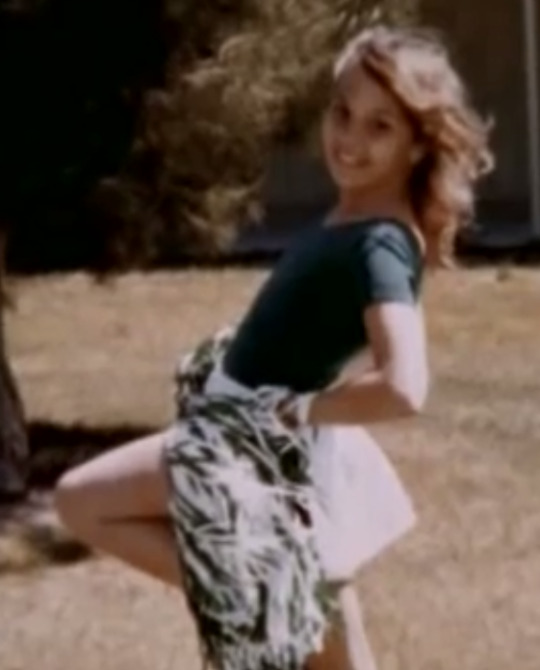
SANDY
“His father was really really strict, and um, I remember one time on his birthday, we were, he was turning thirteen and I believe I was ten and I rode my bike all the way to the mall and I bought him a Nike outfit and he had to sneak out in his back yard and climb up on the brick wall for me give him his gift, because he was on restriction – he was always on restriction – just, for absolutely nothing.”
That’s an almost classical scene of romance, and one wonders how many other secret rendezvous Troy and Sandy had over the years.
In many ways Sandy herself was the counterpart of Troy – the proverbial All American girl; pretty, a cheerleader, precocious and outgoing – though her family was struggling on the line between middle and lower class (Connie Shaw appears to be a single mother). By all counts, Sandy was destined for a typical middle class life herself. Perhaps even with Troy.
SANDY
“When I was thirteen years old I was spending the night at a friend’s house and her step father went into a jealous rage and shot and killed her mother and her mother’s two friends and then killed himself. It changed my life.”
That man was Alex Egyed, a budding computer entrepreneur who may have been a well recognized name today if he hadn’t gone on a rampage and left Sandy covered in blood, huddling in a bathtub with her friend. Unfortunately, that wasn’t the only incident Sandy was going to have with extreme violence.
CONNIE
“Another episode happened to her; she’s walkin’ home from school, uh, sees this guy runnin’ up behind her, girl in front of her, sees the guy shoot…the girl, in the back of the head. She’s already gone through this. Now this is two. How many times – I mean, I’m forty-eight years old, I mean, I’ve never seen anyone, in my lifetime, get shot. She’s seen two.”
These episodes left Sandy a broken girl; a girl barely on the cusp of her womanhood.
SANDY
“I detached myself from my emotions, I didn’t have a sense of life or death, it’s all the same to me.”
Yet she was still a significant part of Troy’s life. And Troy really needed love in his life, since his own family had self destructed.
TROY
“My parents got divorced and I kinda bounced back and forth between them. It was kinda a struggle for me for awhile but, it’s nothin’ outta the ordinary… Any other kid goes through it.”
CONNIE
“His father must have been very tough on him, very abusive, I believe, with him. And his mother was never around. I know they were separated. But I don’t think his mother came around too much, I don’t know if it was because of the father…or what, you know, but uh, I guess he looked at me, more like a mother figure you know because he’s always sent me, even till this day, sends me a bouquet of mother’s day flowers.”
Troy and Sandy were both set adrift at a young age, both from broken homes, both experiencing severe forms of trauma – albeit Troy’s were less extreme. Because of his need for love, Troy grew ever closer to Sandy while Sandy threw herself into an abyss. Like many traumatized girls, Sandy began to slip down into degeneracy and self abuse. She began to hang around shady men and casinos while barely being a fully fledged teen, and at the age of fourteen she ran into James Kelly at the Circus Circus casino.
SANDY
“I met Cotton Kelly at Circus Circus eight months prior to this actual tragedy.”
“He ran some type of, um, adult entertainment business. He wanted me to pose nude for him.”
“He had started following me and calling my house constantly, harassing my family… And as a fifteen year old child, I made a very bad decision, a very immature request and I called upon Troy to beat the man up. To have him, leave me alone.”
A normal girl with a strong family could have resolved this situation with ease. A simple, hard talk by a good father with this James Kelly character would have spared everyone a lot of tragedy. Sandy, however, had drifted far away from being a normal girl and with nothing but a weak family at her disposal she allowed this situation to escalate and continue. Perhaps she even began to be sexual with Kelly, though she does not mention the full depth of their relationship.
In the end she turned to the one man she knew she could depend on.
TROY
“Me and a friend of mine from high school agreed to beat this guy up, because he was doin’ some things to some teenaged girls that we knew. She was a friend of mine, she was like a, a sister kind of, to me.”
“This guy, I felt, was takin’ advantage of a friend of mine, and she asked for my help… And…I…went, kinda overboard.”
Eight months. That’s how long Sandy allowed James Kelly to be a part of her life. How many nights did Sandy turn to Troy? How many nights did she cry on Troy’s shoulder, detailing the horrors that James Kelly inflicted on her – and which she allowed to be inflicted on her. How many times did Troy have to hear Connie, a powerless mother, express her grief and frustration over this older man taking advantage of her daughter? Troy loved both these women.
Troy decided to save them. He told Sandy to lure Kelly out to the desert. So one night, in 1986, Sandy did just that. She made Kelly stop the car, claiming that she needed to pee. She went out, came back, pretended to hurt her leg and when Kelly came out to help her Troy put six bullets in Kelly’s head.
TROY
“For a reason that I, uh, can’t really understand, I decided to bring a gun and shoot the man. And killed him.”
“I didn’t go to sleep that night.”
Troy Kell, eighteen, murdered a degenerate man. He did it because he loved the tragic but degenerate Sandy Shaw. Because they bragged about the murder, soon schoolmates were visiting Kelly’s body in the desert.
When asked if he thought about running Troy said; “Yeah, of course.” When asked why he didn’t, “I…I don’t know. I didn’t have anywhere to run too. I couldn’t just keep on runnin’ and runnin’.”
Troy didn’t run because everything he loved lived on the corner one street over from his house. There was nothing else in the world for him.
One of the children who visited the body in the desert told their parents, and soon the police had Troy, his accomplice and Sandy in custody. They would convict Troy.
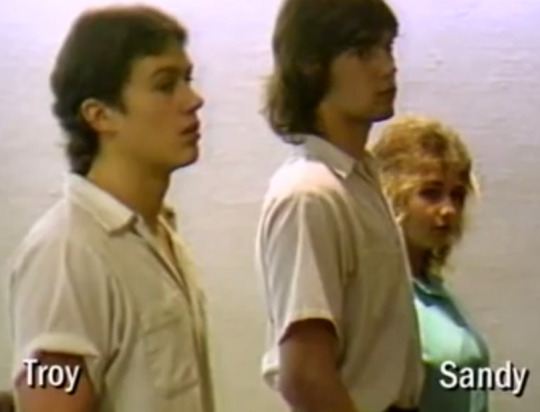
Surprisingly, Sandy was also tried and convicted. These were the days just before peak feminism so women weren’t the infallible angels that they are treated as today but still, after hearing about her abuse and her tragic past, the jurors sent a fifteen year old girl to jail for over twenty years.
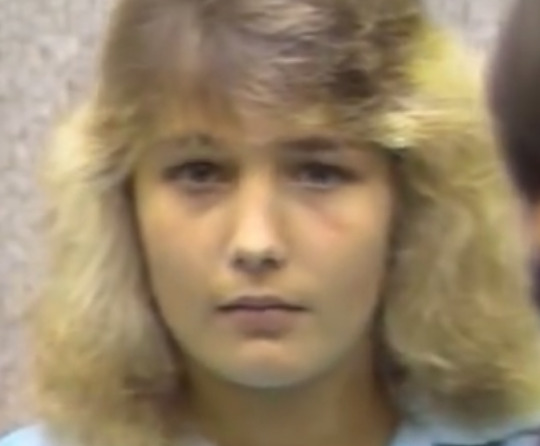
In order to survive in jail, Troy quickly joined up with the white supremacist gangs. Eventually this would lead to the second murderous ambush of his life. Troy and fellow gang member Eric Daniels attacked Lonnie Blackmon with Eric holding his legs and Troy stabbing Blackmon with a shank 67 times. For this second murder Troy himself is currently waiting to face death.
I reiterate once more; by all accounts Troy was a normal kid. There was nothing in his childhood that would have led anyone to believe that Troy one day would end up a murderer of two men while leading a white supremacist gang in prison. If he just had to weather a broken home, as far too many middle class children nowadays do, he may have had a chance to move on and become a man of worth; other men have suffered worse and managed to raise good families and live a good life. Unfortunately Troy had the tragic fate of loving a girl who also came from a broken home, and like most women from such situations Sandy did not have the inner strength struggle for normalcy. She gave herself to degenerates and came to Troy whenever she needed to use his love.
This is a theme all too familiar with young men today. Young men are struggling to find peace in their lives while having to deal with their broken female counterparts. Most men can’t help loving who they love, and far too many men pay too high a price for this once noble emotion. The tragedies surrounding Troy Kell and Sandy Shaw provide an extreme example of this – and in the case of Sandy her despair motivated self destruction is understandable – but the dynamic of good men who need love and the rotten women who use it is one of the great (and unnecessary) social plagues of the modern age. Perhaps it always has been, going back through every society since time immemorial.
It seems nowadays that there is an epidemic of men being destroyed because of single parent upbringings or broken women. Yet Troy was destroyed in 1986. Who knows how many potentially decent men in the past have been destroyed because of similar situations. Who knows how many more in the future we’ll have?
We know the symptoms – it’s time to cure the disease, or we can expect nothing but more and more unnecessary tragedies like Troy Kell’s to occur in the future. Do we really want to grow old and live in a society full of young men like that?
I end with a comment from the video’s youtube page,
Darrylizer1
“Troy Kell is one the one hand a despicable human being, a stone cold killer, a sociopath or near one and a racist. But he’s in some ways he’s likeable, even admirable: he’s articulate, intelligent and is absolutely honest with himself and for the most part unblinded by bullshit. I’m not saying that he should or shouldn’t be put to death. His circumstance is just a very sad waste of human potential.”
*As of this article’s publication, Troy is still awaiting his death sentence. He requested to be shot by a firing squad.
Read More: Sunday In The Park
Although it was written decades ago, Bel Kaufman’s Sunday in the Park remains just as relevant today, if not more so, to what it means to be a man. Her story centers on a family enjoying a Sunday afternoon at the park and is told predominantly from the wife’s perspective. Relaxing on a bench, the wife watched happily as her son Larry played in the sand box before her. Sitting next to her, while reading the ‘Times Magazine section,” was her husband Morton.
Morton. A man as nerdy as his name sounded. Who was, “So citypale, cooped up all week inside the gray factorylike university.”
As Larry played on, she noticed another boy digging in the sand too. This boy was fatter, more aggressive than Larry. And his father, a grizzly looking man, sat on the opposite side and “seemed to be taking up the whole bench as he held the Sunday comics close to his face.”
Suddenly the fat boy threw sand at Larry, making him upset. After hesitating a moment, the wife intervened;
‘Don’t do that, little boy,’ she said sharply, leaning forward on the bench. ‘You mustn’t throw sand!’ The man on the bench moved his mouth as if to spit again, but instead let her speak. He did not look at her, but at the boy only. ‘You go right ahead, Joe,’ he said loudly. ‘Throw all you want. This here is a public sandbox.’
She felt a sudden weakness in her knees as she glanced at Morton.
Morton was listening too. But he hid under his magazine. Seeming to hope the matter would solve it self.
It didn’t.
He put his Times down carefully on his lap and turned his fine, lean face toward the man, smiling the shy, apologetic smile he might have offered a student in pointing out an error in his thinking. When he spoke to the man, it was with his usual reasonableness. ‘You’re quite right,’ he said pleasantly, ‘but just because this is a public place….’
The other man cut him off, and an argument ensued until the large man said “Aw, shut up!” They both rose. Morton reluctantly. The wife nervously imagined the coming violence, about what she should do, how she should react.
Until…
Morton adjusted his glasses. He was very pale. ‘This is ridiculous,’ he said unevenly. ‘I must ask you….’
‘Oh, yeah?’ said the man. He stood with his legs spread apart, rocking a little, looking at Morton with utter scorn. ‘You and who else?’
For a moment the two men looked at each other nakedly.
Then Morton backed down.
‘Come on, let’s get out of here.’ He walked awkwardly, almost limping with self-consciousness to pick up his son Larry and left with his wife by his side.
At first she was relieved. There was no violence. No one was hurt. But as they left the park, she began to feel something else, something…
Inescapable. She sensed that it was more than just an unpleasant incident, more than defeat of reason by force. She felt dimly it had something to do with her and Morton, something acutely personal, familiar, and important.
While walking to their car, Morton rambled on and tried to rationalize his defeat. But the more he did, the more distant she became.
Getting pulled further away from the sandbox, Larry’s cries grew worse. But once he started dragging his feet, Morton and his wife finally had enough.
‘If you can’t discipline this child, I will,’ Morton snapped, making a move toward the boy.
But her voice stopped him. She was shocked to hear it, thin and cold and penetrating with contempt. ‘Indeed?’ she heard herself say. ‘You and who else?’
—
At first glance Bel Kaufman’s story seems simple: There’s a stronger male, Morton backs down, he’s a wimp, needs bigger balls, women hate beta males, etc…
We know that already. But there’s another point to her story that’s hidden below the surface. Because Kaufman’s story isn’t just about lacking courage, it’s about what causes that cowardice; namely, apathy.
As a man, your first reaction to the story might be that she’s saying being a big brute pays off more than being a weakling. The big guy might have shown some dominating, alpha characteristics, but to think that way is to miss Kaufman’s point entirely.
The wife didn’t care that Morton was a nerd; that’s probably why she married him. Perhaps she was one too. But it was Morton’s lack of anger, his lack of pride in himself that bothered her. That he never developed the animal-like rage proving that he was the family’s protector in the most critical of moments.
…more than defeat of reason by force. She felt dimly it had something to do with her and Morton, something acutely personal, familiar, and important.
Morton’s cowardice proved to her what she knew deep down all along, that he didn’t love his family enough the way she did.
It is critical to realize that Kaufman never gave the wife a name in the story but did for the husband. By doing this she was trying to show that the wife had given her up identity to the family, and expected Morton do the same by being a man and fulfilling his end of the bargain.
That courage isn’t so much about standing up for yourself as it is about standing up for others. But he didn’t and that was the source of her resentment. So repeating the “You and who else” remark was a way of saying, “How are you going to raise your son to be a man if you’re not even one yourself?”
The great thing about Bel Kaufman is that she came from a time where women encouraged men to be what they are and not what they should be.
1 note
·
View note